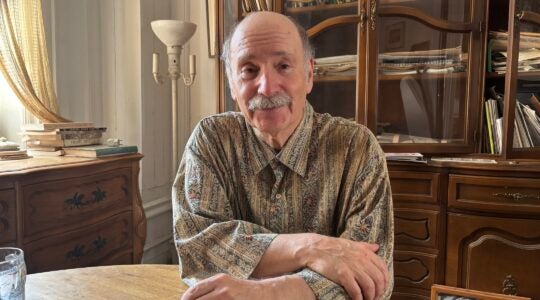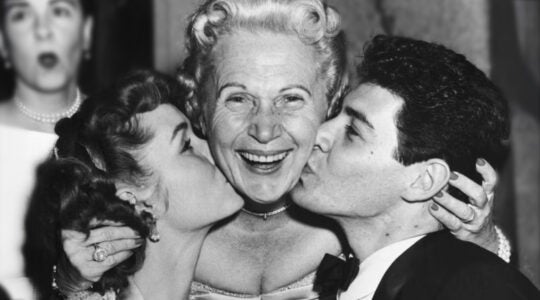They are a reliable — no, ultra-reliable — voting bloc, and therefore a coveted political prize for governors, mayors and City Council members. And Mayor Bill de Blasio, back from his days as a councilman representing Orthodox precincts in Brooklyn, and Gov. Andrew Cuomo have tended the relationship with charedi Jews in Borough Park and Williamsburg with great care.
In the transactional nature of politics, both sides of the equation — powerful politicians and powerful charedi rabbis representing tens of thousands of votes — have benefitted.
But in the wake of the coronavirus outbreak, which has taken a huge toll on the charedi neighborhoods of Borough Park and Williamsburg, that relationship is being severely tested. Harsh condemnations by both Cuomo and de Blasio of charedi Jews who are flouting social distancing rules have driven a wedge, though perhaps a narrow one, between friends, straining the carefully cultivated ties that have taken years to establish.
“The relationship is frayed, it’s been tested,” said Ester Fuchs, professor of International and Public Affairs and Political Science and director of the Urban and Social Policy Program at Columbia University’s School of International and Public Affairs. But, she was quick to add, the situation is not a full-on “rift,” and is unlikely to portend a long-term deterioration in ties between the mayor’s and governor’s offices and the chasidic community.
“Friends disagree with each other” without ending a friendship, said Kalman Yeger, who represents Borough Park and part of nearby Flatbush in the City Council. “Friends have to be honest with each other.”
In the last month, both the mayor and the governor took the chasidic community to task for flouting social distancing recommendations. Following a crowded funeral of a chasidic rabbi in Williamsburg a month ago, Cuomo called on the Orthodox Jewish community to refrain from holding large gatherings, stating that the Police Department would “do what they need to do” to enforce social distancing regulations. “I made it clear … that these social distancing regulations are not just please, they are regulations that you can be fined for,” he said.
And last week, in a more heated dustup, de Blasio singled out “the Jewish community” after another large chasidic funeral in Williamsburg drew a crowd of thousands into the street.
In a trio of tweets, the mayor said he had had instructed his police department to fine or even arrest social distancing violators. “My message to the Jewish community, and all communities, is this simple: the time for warnings has passed. I have instructed the NYPD to proceed immediately to summons or even arrest those who gather in large groups. This is about stopping this disease and saving lives. Period.”
Accusing the mayor of fanning the flames of anti-Semitism, a wide range of Jewish organizations faulted de Blasio for making a reckless, intemperate declaration. The Jewish responses to de Blasio’s included accusations that the mayor engaged in “scapegoating” the entire Jewish community for the actions of a few. Among those criticizing de Blasio’s words were Rep. Jerry Nadler, members of the City Council, State Senate and State Assembly, the Simon Wiesenthal Center, the World Jewish Congress, the Anti-Defamation League CEO Jonathan Greenblatt, and the Bend the Arc human rights organization.
The mayor’s tweets had managed to bring together usually disparate Jewish organizations and leaders, Fuchs noted.
Some critics noted that de Blasio had not responded in similarly strident terms earlier when New Yorkers gathered in parks to watch military planes fly over the city in a show of support for city workers. Others pointed to the mayor’s own habit of walking in Brooklyn’s Prospect Park, where crowds sometimes gather on sunny days in spite of social distancing guidelines.
And former State Assembly member Dov Hikind said a computer study of “anti-Semitic activity on Twitter” after the mayor’s tweets indicated “astounding data that makes clear as day the magnitude of damage caused to the Jewish people.” The charedi news site Voz Is Neis cited Hikind’s “data analyst Mordy Rubin,” who noted that as news of de Blasio’s remarks trended on Twitter, so did anti-Semitic reactions.
Over the years, Mayor de Blasio has cemented his ties with the chasidic community. He supported the community’s positions on metzitzah b’peh, a circumcision technique in which the mohel uses his mouth to suck blood from the baby’s wound, by rescinding a parental consent form mandated by the Bloomberg administration. He was accused of slow-walking a Department of Education investigation into substandard secular education at several dozen charedi yeshivas. And before issuing tough measures requiring measles vaccinations, he was accused of dragging his feet when measles diagnoses spiked among some charedi neighbhoods.
“He has given them a wide berth to manage their own community,” Fuchs said.
De Blasio himself spoke of those ties last week at a news conference in which he addressed his tweets.
“I have a long, deep relationship with the Orthodox Jewish community, a lot of personal relationships, a lot of people I know and respect,” he said. “I have a lot of love for the community.”
Critics like Hikind, who served as an outspoken advocate of Orthodox interests during nearly two decades in the State Assembly, suggest the romance has soured. Hikind points to the fact that de Blasio is not seeking re-election in suggesting the mayor may be less inclined to play to charedi interests. Term-limited, “he doesn’t need people’s votes anymore,” said Hikind.
And, Hikind said, the actions of some charedi Jews in ignoring the mayor’s directives last week to fulfill their religious obligations can be seen as a sign that the generally progressive positions of de Blasio often conflict with Orthodox Jews’ conservative views. “He doesn’t represent their values,” said Hikind.
“A very specific issue”
But several politicians and representatives of Jewish organizations call the recent dust-ups a blip in otherwise harmonious relations between the charedi community and the mayor and governor. They say it is too early to state what direction the relationship will take after the Covid-19 pandemic ends. And political and Jewish leaders add that the flouting of the social distancing rules was committed by only a small, unrepresentative number of young charedi Jews, many of whom do not have access to television news reports or the internet that had carried the social distancing warnings.
“It’s not the leadership” of the chasidic community who flouted the social distancing regulations, said David Luchins, professor of political science at Touro College.
“This was a very specific issue,” not a symbol of a larger estrangement, said an official in a prominent Jewish organization who asked not to be identified.
In a sign of the delicate nature of the relationship, several Jewish leaders pointed to recent letters of support for de Blasio issued by both sides of the fractured Satmar community, including the the Yetev Lev D’Satmar and its affiliated Central United Talmudic Academy.
“Politics are always shifting,” said sociologist Samuel Heilman, who has written extensively about charedi Jews. “The chasidic community has always learned how to adapt and let bygones be bygones when it comes to their needs. Same for politicians.”
“They need each other,” Luchins said, calling de Blasio “the best mayor they [the charedi community] ever had.”
The charedi community will need to maintain a close relationship with de Blasio, whose term will end in 1½ years, Fuchs said, adding that the mayor’s wife, Chirlane McCray, is likely to run for Brooklyn borough president. “He still needs the community.” And the chasidic community “needs all the political good will they can muster.”
Fuchs called the tweets “a mistake … an isolated incident, not an indication that he no longer will be responsive to the community.”
Fuchs pointed to three upcoming signs to judge how the mayoral-charedi relationship develops after the height of the Covid-19 crisis: the identity of people appointed to City Hall task forces; future access to the mayor; and the frequency of highly publicized meetings.
The mayor’s long-term ties with the charedi community apparently paid off last year.
In an attempt to garner donations for his unsuccessful presidential campaign, de Blasio sought help from Brooklyn’s charedim, asking in Yiddish — online and through WhatsApp — for 10,000 individual donors to give $1 each. The appeals emphasized that donations did not necessarily imply support for the mayor’s left-wing presidential campaign, but simply would earn him a spot in Democratic debates. The appeals, according to Politico, also implied that he would reward the community with favorable treatment in the future. “By donating the dollar you support your needs, the entire ultra-Orthodox public and our rights and needs by answering the call of (influential people) who need to show that the public recognizes those who understand our interests,” one message stated.
The mayor’s campaign did not report how much money was raised in the targeted pitch to charedim.
As a sign of a still-strong relationship, the letter issued last week by the Yetev Lev D’Satmar and Central United Talmudic Academy expressed “our strong support for the extraordinary efforts undertaken by NYC Mayor Bill de Blasio during the devastating COVID-19 pandemic. We strongly denounce the vicious attacks against the Mayor, particularly those accusing him of anti-Semitism. The close relationship between Mr. De Blasio and our community go back close to two decades, during which time we have come to know, respect and appreciate his understanding and sensitivity to the unique needs of our community. We consider him a dear friend and pray for his success.”
“Our positions remain consistent,” Mayer Rispler, a leader of the Satmars’ Aronim faction, wrote “We do not condone any behavior that puts people at risk and pledge to keep working alongside the brave men and women of the NYPD in addressing and eliminating any such occurrences.”
Shaul Perlstein, a leader of the Zaloynim faction of Satmar, also praised the mayor in a letter that was shared widely on Twitter.
“We want to disavow the attacks and derogatory language against our mayor, from people from outside the community and from reckless people among us,” he wrote. “We call upon the entire community not to be drawn into their views and not be influenced by those big-mouths on hotlines and the internet who are trying to kindle a fire of hate, it shall never happen.”
Naftuli Moster, a Borough Park-born onetime-chasid who has become an advocate of stronger secular studies in charedi schools, suggested that the mayor’s language, referring to the “Jewish community” instead of singling out chasidic Jews, reflected his still-strong support for — and in — chasidic circles. Moster called the mayor’s tweets “a continuation of that special relationship. It was very clear this wasn’t a Modern Orthodox or Reform funeral, but a chasidic one. But the mayor still couldn’t bring himself to criticize chasidic leaders who have failed again and again to compel their followers to keep the social distancing guidelines.
“In fact,” Moster said, “just earlier that day he told a reporter that chasidic leaders have been very cooperative … So to remain consistent, he simply lashed out at the ‘Jewish community’ and ‘all communities” as opposed to once and for all saying what we all know to be true: he’s let chasidic leaders do whatever they wanted even at the expense of children’s health, education, and safety.”
The New York Jewish Week brings you the stories behind the headlines, keeping you connected to Jewish life in New York. Help sustain the reporting you trust by donating today.




